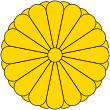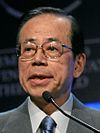
The politics of Japan are conducted in a framework of a multi-party bicameral parliamentary representative democratic constitutional monarchy whereby the Emperor is the ceremonial head of state and the Prime Minister is the head of government and the head of the Cabinet, which directs the executive branch.

Takeo Fukuda was a Japanese politician and the 42nd Prime Minister of Japan from 24 December 1976 to 7 December 1978.

Shigeru Ishiba is a Japanese politician. Ishiba is a member of the Liberal Democratic Party (LDP) and of Heisei-Kenkyukai until 2011. He was Minister of Defense from 2007 to 2008 and was also Minister of Agriculture, Forestry and Fisheries. The LDP lost government in 2009, and in 2012 after challenging for the presidency of the LDP and losing to Shinzō Abe he accepted the position of Secretary-General of the LDP on 27 September 2012. Since 3 September 2014 he has served in cabinet as minister overseeing regional economic revitalization and policies aimed at reversing population decline.

Nobutaka Machimura was a Japanese politician. He was a member of the House of Representatives of Japan and a member of the Liberal Democratic Party. He was Chief Cabinet Secretary in the government of Prime Minister Yasuo Fukuda from 2007 to 2008 and twice Minister for Foreign Affairs, in the cabinets of Junichiro Koizumi and Shinzō Abe. He resigned as the Speaker of the House of Representatives on 21 April 2015 after suffering from a stroke.
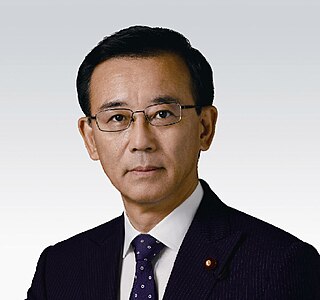
Sadakazu Tanigaki is a Japanese politician who served as Minister of Finance from 2003 to 2006 in the cabinet of Jun'ichirō Koizumi. He also served as Minister of Construction and Transport in the cabinet of Yasuo Fukuda and served his ninth term as a member of the House of Representatives, representing Kyoto's Fifth District. He was elected as President of the Liberal Democratic Party (LDP) on 28 September 2009, following the party's massive defeat in the 2009 general election. He was replaced by Shinzō Abe on 26 September 2012. He was only the second LDP leader who was not simultaneously Prime Minister of Japan.

Tarō Asō is a Japanese politician who is the Deputy Prime Minister and Minister of Finance. Asō was the 59th Prime Minister of Japan, serving from September 2008 to September 2009. He was also a member of the Japanese shooting team at the 1976 Montreal Olympics.

Yuriko Koike is a Japanese politician who currently serves as the governor of Tokyo. She was a member of the House of Representatives of Japan from 1993 to 2016, and was previously the Minister of Defense in the cabinet of Prime Minister Shinzō Abe, but resigned in August 2007 after only 54 days in office. On 31 July 2016, Koike was elected Governor of Tokyo, the city's first female governor.

A general election in Japan was held on 11 September 2005 for all 480 seats of the House of Representatives of Japan, the lower house of the Diet of Japan, almost two years before the end of the term taken from the last election in 2003. Prime Minister Junichiro Koizumi called the election after bills to privatize Japan Post were voted down in the upper house, despite strong opposition within his own Liberal Democratic Party (Japan) (LDP).

Nobuteru Ishihara is a Japanese politician who was Secretary General of the Liberal Democratic Party from 2010 to 2012.
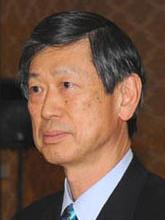
Masahiko Kōmura is a Japanese political activist, and former Vice-President of the Liberal Democratic Party (LDP). He was Minister for Foreign Affairs from 1998 to 1999 and again from 2007 to 2008, and he is a member of the House of Representatives for Yamaguchi 1st district.

Kaoru Yosano was a Japanese politician. He was a member of the Liberal Democratic Party (LDP), the Sunrise Party of Japan and former member of the House of Representatives, serving his ninth term in the Lower House representing Tokyo's first electoral district until his defeat in the Japanese general election, 2009. Yosano was Chief Cabinet Secretary to Prime Minister Shinzō Abe from August 2007 to September 2007 and was Minister of Economic and Fiscal Policy in Tarō Asō's administration from February to September 2009.
A leadership election was held in the Liberal Democratic Party of Japan on 20 September 2006 after the incumbent party leader and Prime Minister Junichiro Koizumi announced his intention to resign, a year after he led the party to victory in a snap election. Shinzō Abe won the election,. His chief competitors for the position were Sadakazu Tanigaki and Taro Aso. Yasuo Fukuda was a leading early contender, but ultimately chose not to run. Former Prime Minister Yoshirō Mori, to whose faction both Abe and Fukuda belonged, stated that the faction strongly leant toward Abe. Abe was subsequently elected Prime Minister with 339 of 475 votes in the Diet's lower house and a majority in the upper house.
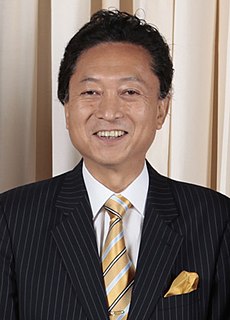
A general election for the Japanese House of Representatives was held on August 30, 2009. The opposition Democratic Party (DPJ) defeated the ruling coalition in a sweeping victory, winning 221 of the 300 electoral districts and receiving 42.4% of the proportional block votes for another 87 seats, a total of 308 seats to only 119 for the LDP.

A leadership election was held in the Liberal Democratic Party of Japan on 22 September 2008 after the incumbent party leader and Prime Minister of Japan Yasuo Fukuda announced that he would resign on 1 September 2008, only 11 months after taking office on 25 September 2007 following a leadership election on 23 September 2007. Taro Aso, who had lost to Fukuda in the 2007 leadership election, was widely seen as the frontrunner to replace him, and announced on 2 September 2008 he was ready to take over as party leader. Aso won the leadership election against four opponents, receiving 67% of the vote.
The Liberal Democratic Party of Japan is the ruling party of Japan, with Party President Shinzō Abe being the Prime Minister of Japan. The Liberal Democratic Party is characterized by factionalism, where factions are sub-groups within a larger organisation. While factions characterize other political parties in Pacific Asia, Japanese factionalism is distinguished by its stability and institutionalization. Since the genesis of the Liberal Democratic Party in 1955, factions have existed, but they have changed over time. Despite this change, factions in the party today can be traced back to their 1955 roots, a testament to the stability and institutionalized nature of Liberal Democratic Party factions.
A leadership election was held in the Liberal Democratic Party of Japan on 28 September 2009 after the incumbent party leader and outgoing Prime Minister of Japan Tarō Asō announced that he would resign after losing badly in the general election held on 30 August 2009. Asō announced on 8 September he would resign on 16 September 2009, which he did as planned.
A leadership election was held on 20 September 2018 to elect the next president of the Liberal Democratic Party of Japan for a new 3-year term. Incumbent president Shinzō Abe was running for re-election after a rule change in 2017 that allowed him to run for a third term.
